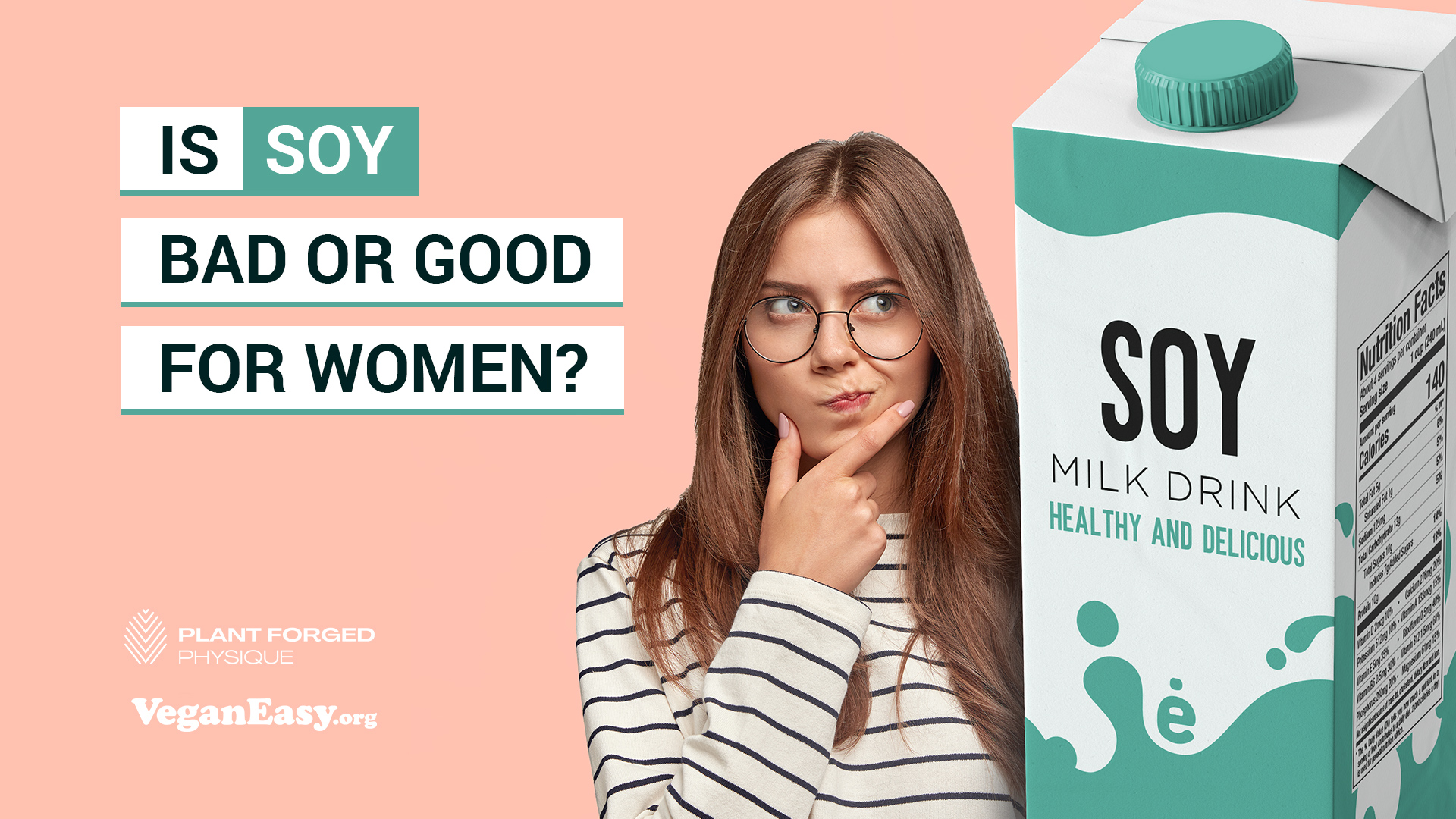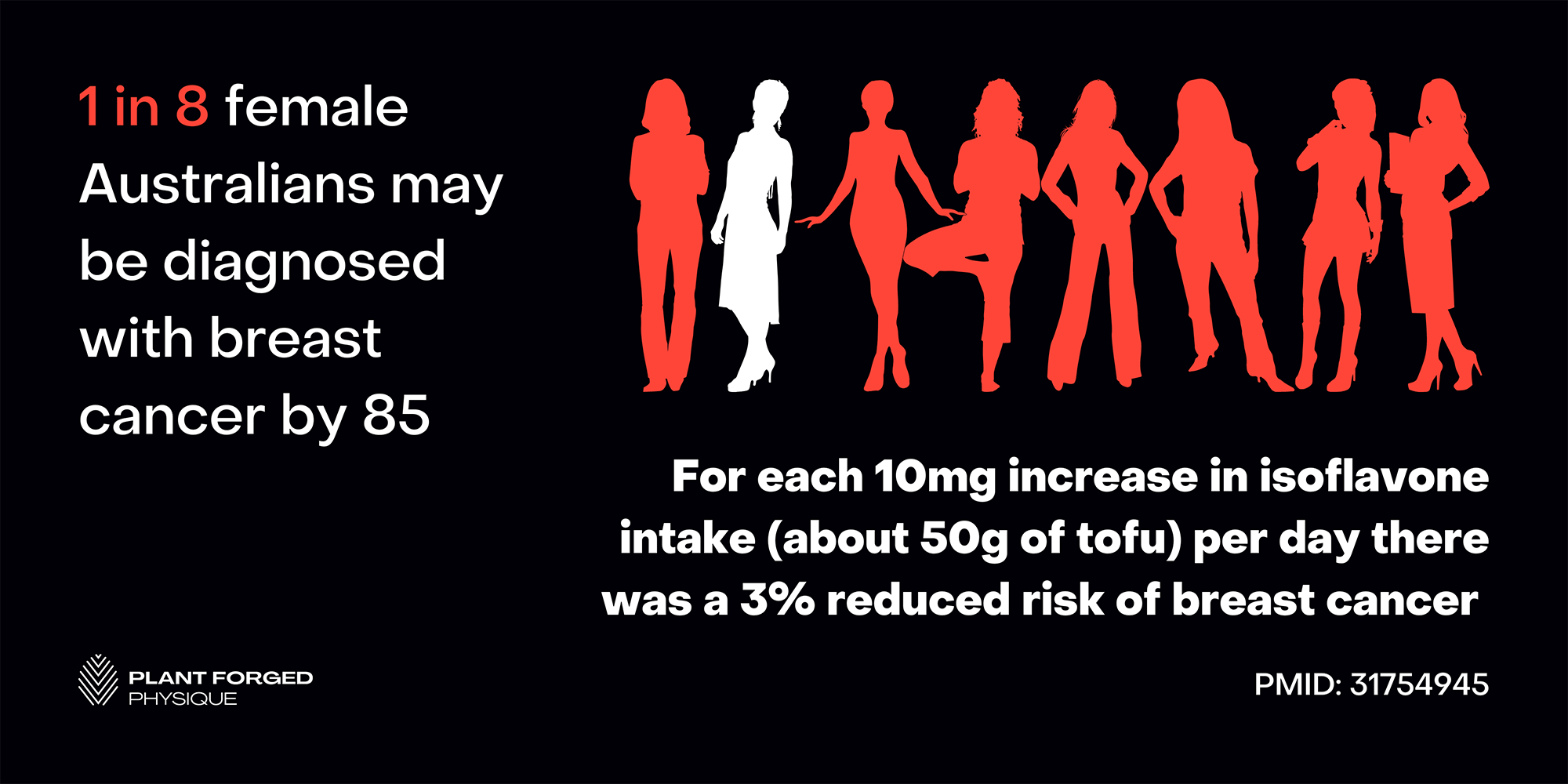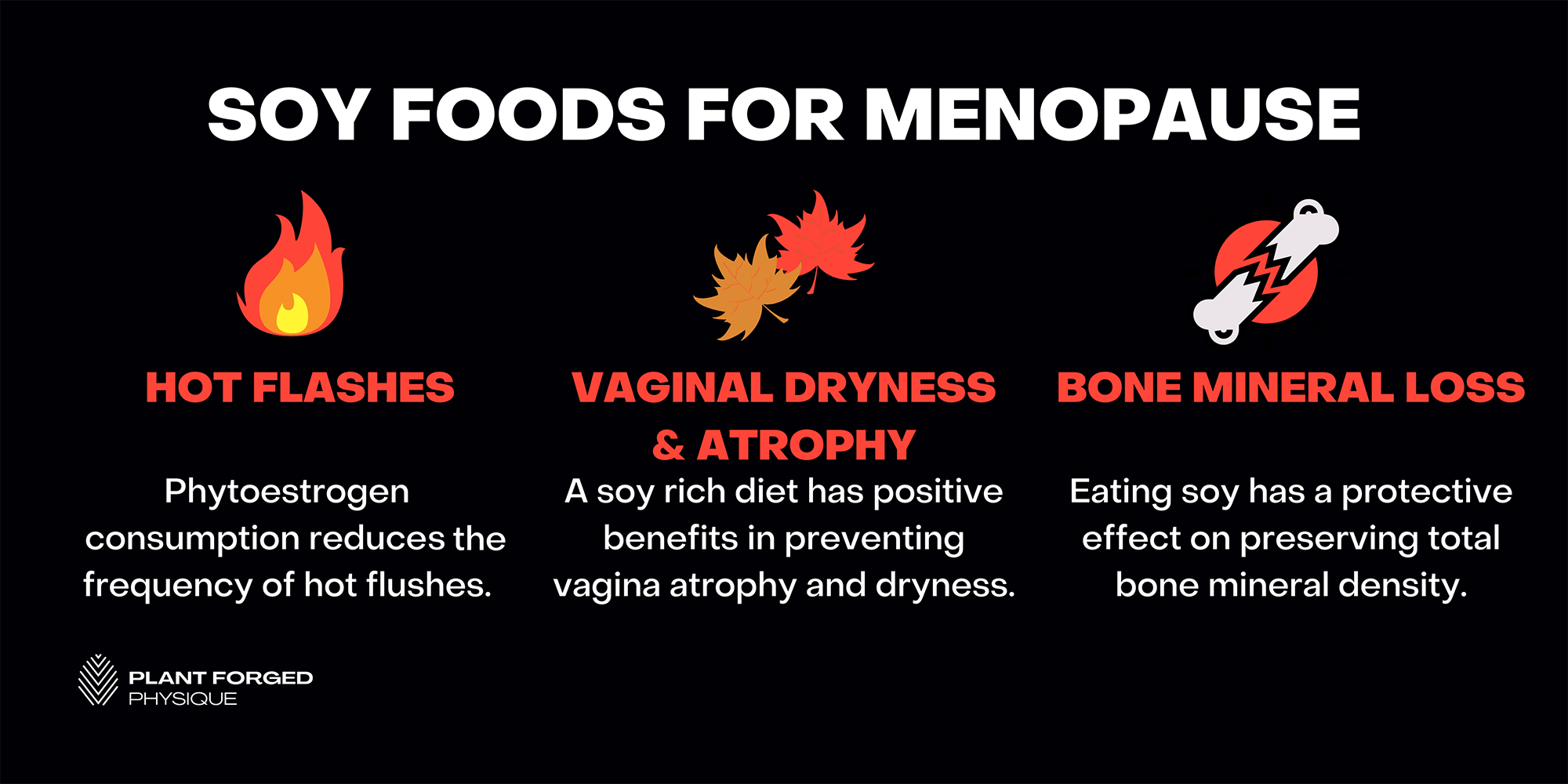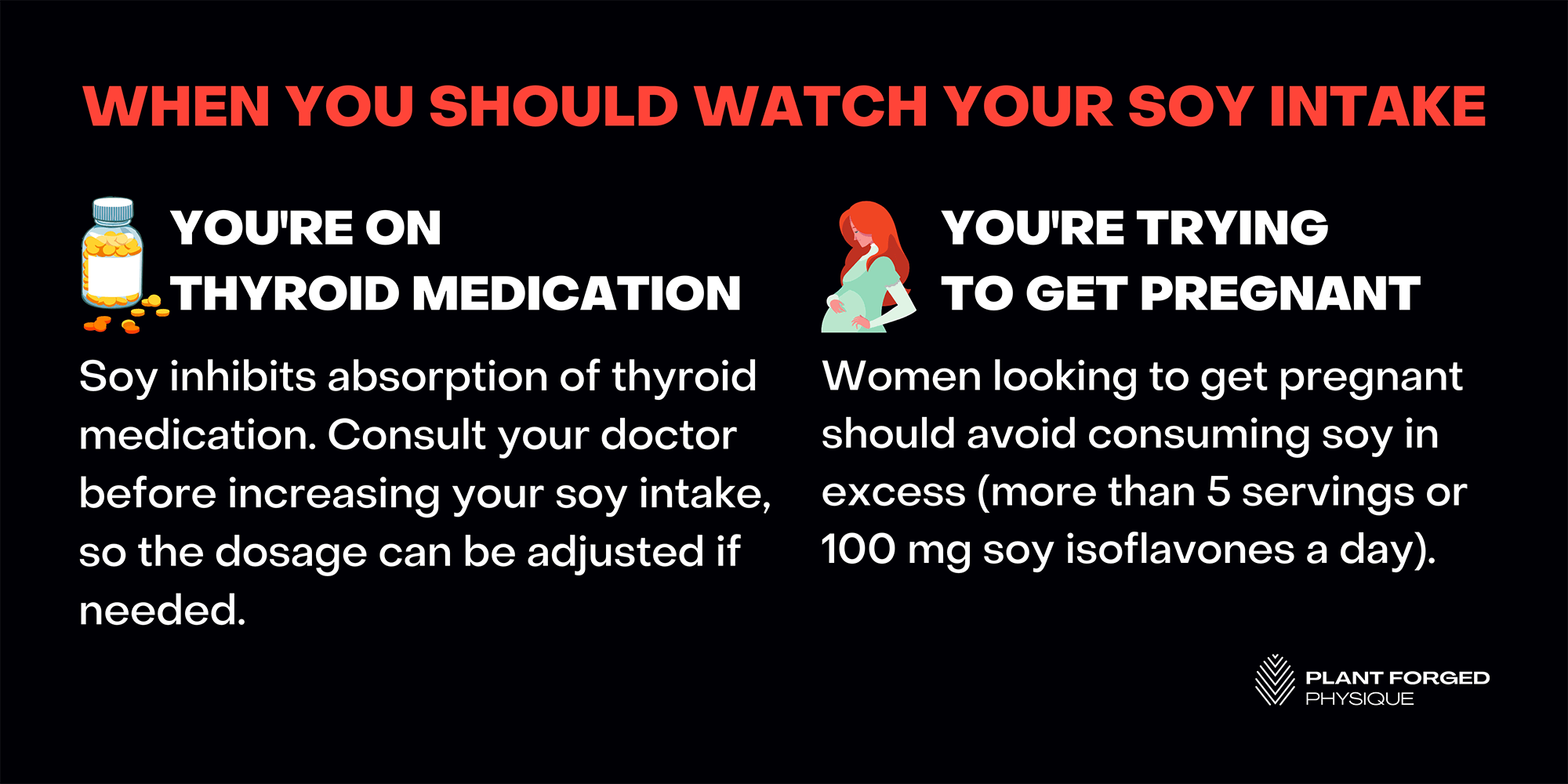See also…
Will soy give me man-boobs?
What men should know about soy.

Article by Caitlin Adler, a vegan Accredited Sports Nutritionist, Strength & Conditioning coach and bodybuilder at Plant Forged Physique. Her passion is helping vegans achieve their health and fitness goals with evidence-based guidance and expertise. Check out their free Vegan Supplement Cheat Sheet and other resources.
The misconceptions and controversy surrounding soy seems to never end! You’ll sometimes hear claims that soy interrupts female hormones, impacts the thyroid, or even causes cancer.
This contention typically comes from claims made about the isoflavones in soy. Isoflavones are a type of phytoestrogen, also known as plant oestrogens. These weakly mimic oestrogen and partially bind to oestrogen receptors.
This created concern that phytoestrogens could alter or have a negative effect on female bodies, like changing hormone levels, or fuelling the growth of hormone-sensitive cancers such as breast cancer.
However, human trials show that soy does not increase oestrogen or affect oestrogen-sensitivity. In fact, there’s quite a bit of research demonstrating the health benefits women can experience from consuming soy.
The benefits of soy for women
BREAST CANCER
In 2021, it was estimated that 1 in 8 female Australians have a chance of being diagnosed with breast cancer by the age of 85.
Consuming soy is linked with a reduced risk of breast cancer incidence, recurrence, and mortality. A 2020 review found that for every 10 mg increase in isoflavone intake (the equivalent of about ~50 g of tofu) per day there was a 3% reduced risk of breast cancer.
Soy-consuming Asian countries also have lower breast cancer rates. For every 100,000 women, breast cancer occurence ranges from 25.9-39.2 in Asian nations compared to 94.2 in Australia and New Zealand, or 92.6 in Western Europe.
The theory behind this is that isoflavones may block the more potent natural estrogens in the blood on oestrogen sensitive cancers.

HOT FLASHES
During menopause, women will typically experience hot flashes in which they get a sudden warm feeling, skin reddening, and sweating.
Research indicates hot flashes occur when decreased oestrogen causes your body to become more sensitive to slight changes in body temperature.
A 2014 review of ten studies found the consumption of phytoestrogens resulted in a greater reduction in hot flush frequency compared to a placebo.
VAGINAL DRYNESS AND ATROPHY
Another symptom of menopause that many women will experience is vaginal atrophy. This is the thinning, drying and inflammation of the vaginal walls that occurs when the body has less oestrogen. It often results in itching, burning or soreness.
Studies have looked into both the effects of a soy-rich diet and applying topical isoflavone creams, and seen positive benefits in preventing vaginal atrophy and dryness in postmenopausal women.
BONE DENSITY
The risk of osteoporosis increases during menopause as bone mineral density decreases. An annual bone loss is around 0.5% for premenopausal women, 2% to 2.5% for women going through a pre to post-menopausal transitional, and about 1.5% in postmenopausal women.
A 2007 review found that isoflavones decreased bone loss in menopausal women. Another 2008 study found that while dietary calcium intake didn’t seem to play an important role in the prevention of bone loss during menopause, the amount of soy in their diet had a protective effect on preserving total bone mineral density.

OTHER BENEFITS
In addition to these female-specific benefits for soy, there are other benefits that both women and men experience:
- Increasing your isoflavones intake by 10 mg a day decreases mortality for all cancers by 7%
- Lowers your risk of gastric, colorectal, and lung cancers
- Lowers your risk of dying from coronary heart disease
Two considerations for soy consumption
There are two situations in which women may want to be conscious of their soy consumption.
THYROID DISEASE
Thyroid disease affects 10 times more women than men worldwide. More recent smaller studies in Australia have also shown that around 10% of pregnant women suffer from mild hypothyroidism.
There were concerns that the bioactive isoflavones in soy may affect thyroid function, and influence or worsen thyroid disease. A review of 14 studies found soy had no impact on thyroid function.
But what it did show is that soy inhibits absorption of the synthetic thyroid hormones found in thyroid medication.
So while soy does not impact the thyroid itself, it does interfere with the absorption of thyroid medication. Those who are taking these medications should consult a doctor before increasing their soy intake, so the dosage can be increased if needed.
OVULATION
There’s mixed research around how soy impacts ovulation. Ovulation occurs when the cyclic follicle stimulating hormone (FSH) and luteinizing hormone (LH) are released by the anterior pituitary gland.
Studies on pre-menopausal women have shown mixed changes to FSH and LH – some showing decreases or no changes at all. It’s worth noting that these studies contained 100-165 mg of isoflavones per day, which is the equivalent of 5-6 servings of soy and much higher than what the average population would consume.
For context, a typical soy-consuming Asian diet includes between 10-25 mg of isoflavones per day, and studies looking at around 50 mg per day have shown little to no impact on circulating levels of reproductive hormones.
So the data suggests that women looking to become pregnant should avoid consuming soy in excess (more than 5 servings or 100 mg soy isoflavones a day) as this can lead to temporarily reduced ovarian function.

In Summary
The prevailing myths about soy consumption can often overshadow its proven benefits. Soy is filled with protein, calcium, iron, magnesium, zinc and more, and a fantastic nutrition source.
On top of that, there are health benefits specific to women such as lowering the risk of cancer and lessening symptoms and side effects of menopause like hot flashes, vaginal dryness, and bone mineral loss.
There are however two instances where soy consumption should be monitored:
- If you are on thyroid medication, it’s worth discussing your soy consumption with your doctor.
- If you’re trying to get pregnant, it’s safe to consume less than 5 servings of soy per day.
But for the majority of women who don’t fit within these two scenarios, the research tells us that soy is safe to eat, is beneficial and can be consumed regularly.

